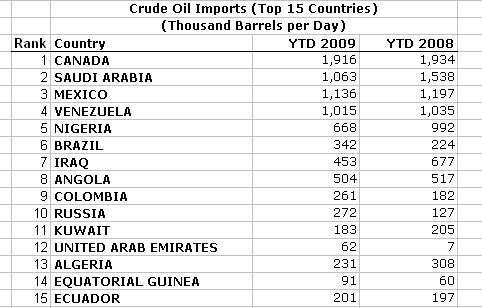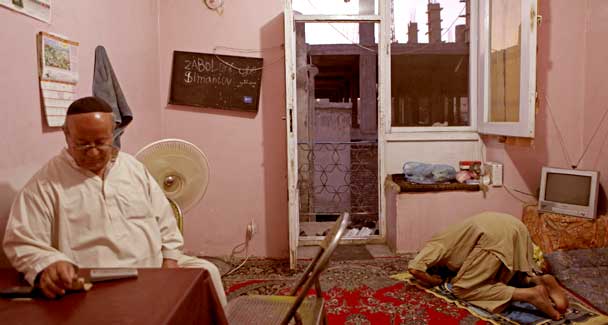When you’re inside the United States, it is nearly impossible to realize how insular it is, especially related to information and perspective.
Since we’re going to be here for a while, I’m providing a semi-regular injection of outside perspectives and information gleaned from other cultures, counties and regions in an effort to mitigate some of that insularity.
If you’d like to keep in touch with this information feed, please subscribe via RSS or email using the menu options on the right-hand sidebar.
Quote
Source: The Economist http://www.economist.com/displayStory.cfm?story_id=14548871
But a bigger problem is that China’s own world view has failed to keep pace with its growing weight. It is a big power with a medium-power mindset, and a small-power chip on its shoulder.
Factoid
Today’s factoid is the list of countries that supply the U.S. with oil as of June, 2009
Source: Energy Information Administration http://www.eia.doe.gov/pub/oil_gas/petroleum/data_publications/company_level_imports/current/import.html
Note that the U.S. sends about $1 Billion per day overseas to purchase oil.

Books
Today’s book recommendation: After the Prophet: The Epic Story of the Shia-Sunni Split in Islam.
Westerners are whipsawed daily by events in the Middle East and around the world driven by Islam, but very, very few understand even the most basic things about Islamic culture and history, especially about the differences between Sunni and Shia Muslims. This book presents that story in an entertaining and highly informative manner. The book is written for and to a western general-interest audience, and provides an understandable “road map” to understanding places, people and events that continue to shape our world today.
Book site: http://www.aftertheprophet.com/ Amazon: http://www.amazon.com/After-Prophet-Story-Shia-Sunni-Split/dp/0385523939
I read the Kindle edition. My review on Shelfari: http://www.shelfari.com/books/5861472/After-the-Prophet-The-Epic-Story-of-the-Shia-Sunni-Split-in-Isla/reviews/1351890
World News, Opinions and Perspectives
(Note that these world news sources are English language newspapers and news web sites. As such, they may exhibit a Western bias. To fully understand the local perspective it is best to read news, opinion and information in the native language.)
India
Source: The Times of India http://timesofindia.indiatimes.com/news/world/us/Obama-pilloried-over-ducking-Dalai-Lama-to-appease-China/articleshow/5092820.cms
Headline: Obama pilloried over ducking Dalai Lama to appease China
Excerpt: The US President is going to Beijing next month at a time the US is widely seen as a declining entity and China as a growing power.
Why you should care: The U.S. is in a delicate balancing act between China and India, two countries each with more than a billion people, nuclear arms and the world’s destiny in their hands. What pleases one often displeases the other. Displease them enough and it affects not only your country, but you, individually.
Africa
Source: iol.com South Africa http://www.int.iol.co.za/index.php?set_id=1&click_id=68&art_id=nw20091006094000582C238237
Headline: Egypt’s top cleric plans school face veil ban
Excerpt:
Egypt’s top Islamic cleric is planning to bar students wearing the face veil from entering the schools of al-Azhar, Sunni Islam’s premier institute of learning, according to an independent daily.
Tantawi angrily told the girl that the niqab “has nothing to do with Islam and is only a custom” and made her take it off.
Why you should care: Fully covered women are often symbols of fundamentalist Islam and corresponding ideology and politics. Governments in the region walk a fine line between upholding the tenants of Islam and alienating their populations as they attempt to limit the rise of fundamentalist challenges to their power, especially in Egypt.
Iran
Source: Iran Daily http://www.iran-daily.com/1388/7/12/MainPaper/3513/Page/2/?NewsID=116
Headline: Western Media Not Really Free
Excerpt:
President Mahmoud Ahmadinejad said western corporate media has turned into a weapon of subterfuge with the intention of helping advance the West’s narrow political agenda.
According to the president, unbiased media simply does not exist in the West.
“Claims of freedom of the press are sheer lies. Each and every one of the western media outlets primarily serves the interest and policies of their states,” he declared.
Why you should care: Before you shrug this off as more ranting from a certifiable nut job, let me add the following. During our travels overseas, especially in south Asia and the Middle East, I personally witnessed examples of Western media blatantly distorting, omitting or filtering facts to advance specific agendas. What you think is the news is often not, it can be not much more than propaganda in support of a specific political or social goal.
China
Source: Peoples Daily http://english.people.com.cn/90001/90776/90883/6772134.html
Headline: China open to unified East Asia proposal
Excerpt:
Yang said: “China will continue its receptive attitude on East Asian cooperation with relevant sides,” in the release.
There is a conceptual gap, however, between Beijing and Tokyo as China prefers the East Asian community to be restricted within the ASEAN+3 grouping; Japan wants to involve some other countries and even the United States, Zhou said.
Why you should care: Students of history will feel nervous tremors as echos of the “Greater East Asia Co-Prosperity Sphere ” sound in their heads. That was the framework that Japan used to rationalize their invasions of Asia in WWII. This initiative is also being championed by Japan, although in a very different context. This framework, if realized, will be one of Japan’s last remaining methods of being an ongoing factor in Asia as Japan’s population ages, its economy suffers and China rises to total dominance in the region. The tug of war over membership in this grouping will be a proxy for the battle of influence and control between Japan and China.
Russia
Source: Moscow Times http://www.themoscowtimes.com/news/article/384878.html
Headline: Alfa, Telenor Agree to $23Bln Merger
Excerpt: “Trust is often key in business.”
Why you should care: Russia spent most of the last decade seizing control and assets from foreign investors via a pile of cash from natural gas and oil sales. Now that oil prices are down and Europe is working frantically to lessen their dependence on Russian natural gas, Russia is once again courting and encouraging foreign direct investment, even in once off-limits “strategic” sectors. Nothing cements common destiny like common trade. The more Russia is intertwined with the outside world via trade the less the chance they will do truly stupid things to underline their ascent back into the “important nations” club.
Turkey
Source: Sabah http://english.sabah.com.tr/
Headline: Seven-thousand kilometer project is awaiting parliamentary approval
Excerpt:
Minister of Foreign Affairs Ahmet Davutoglu suggested a “road for peace” span from the Caucasus to Europe, within the framework of the Armenian expansion.
The Highway, which will pass through 12 different countries and 24 cities, will connect the Caucasus to the Balkans and then to European highways. Therefore, the Black Sea Highway will provide the network system to access Europe. An individual will be able to leave Baku and access Western Europe.
Why you should care: One of the most important geopolitical seismic shifts in recent memory is Turkey and Armenia seeking rapprochement with concrete steps to defuse tensions and re-open normal diplomatic relations. This highway project is more than a symbolic gesture. It is a statement of what this region could become: a center of gravity of influence, resources and inter-cultural and trade exchange.
Indonesia
Source: The Jarkata Post http://www.thejakartapost.com/news/2009/10/06/government-targets-big-cities-crackdown-illegal-software.html
Headline: Government targets big cities in crackdown on illegal software
Excerpt:
The team put up posters inside the Mangga Dua International Trade Center mall in Central Jakarta on Tuesday, urging people not to buy or produce illegal software.
The International Data Corporation estimates the rate of software piracy in Indonesia has increased by 1 percent in 2008 to 85 percent from the previous year, causing US$544 million in losses to copyright holders.
Why you should care: Note that the government crackdown consisted of putting up posters and that the current rate of software piracy is 85 percent. Outside the post-development countries (U.S., Europe, Japan, Australia, etc.) there is essentially no copyright or intellectual property (IP) protection of any kind. Developing country governments are loathe to provide any real IP protection as it would put the brakes on development and productivity growth. Currently, they can essentially automate their countries’ business processes for free. The tipping point comes when a country starts to develop its own IP, that is when they will start to enforce IP protection, albeit most aggressively on their indigenous products.
Egypt
Source: Daily News http://www.thedailynewsegypt.com/article.aspx?ArticleID=24923
Headline: Egypt to raise energy prices for non-intensive industries
Excerpt: Egypt will decrease subsidies on natural gas and electricity to non-energy intensive industries, the local press reported, raising prices 26 percent by the beginning of 2010…
Khalid Sekkat, research director at the Economic Research Forum, said that the subsidy on diesel is noticeably absent from the restructuring effort. “While butane is largely limited to familial use, increasing the price of diesel would likely lead to dissatisfaction from all areas of the transportation sector,” Sekkat told Daily News Egypt.
Sekkat commented on Egypt’s subsidy restructuring as part of a larger trend of liberalization that has accompanied efforts to further integrate the MENA region into the globalized world economy.
Why you should care: Most developing countries heavily subsidize core products in their economies such as fuel. This creates highly distorted economies that are ill suited to compete in the global market. As seen in this story, even though some countries are making steps to reduce energy subsidies, they are unable to reduce or eliminate energy subsidies that affect the broad populace (butane/propane/GLP, diesel, etc.). As we’ve seen in the U.S., artificially low fuel prices lead to societies developing in non-energy-efficient forms, such as uncontrolled sprawl. The easiest way to measure a country’s relative level of development is to look at their total energy consumption, especially on an per-capita basis. An economy that depends on artificially subsidized energy will be incapable of sustainable growth.
Saudi Arabia
Source: Arab News http://www.arabnews.com/?page=1§ion=0&article=127120&d=6&m=10&y=2009
Headline: King Abdullah to visit Syria
Excerpt:
King Abdullah’s landmark visit to Damascus reflects the improving relations between the two Arab countries.
Lebanese leaders were also happy over the talks between King Abdullah and Assad. “President Assad’s visit to the Kingdom is an important step upon which we must build,” said Fouad Siniora, who is Lebanon’s caretaker prime minister and a member of Saad Hariri’s Future Movement.
Why you should care: Anything that happens in the Middle East in the way of stabilization, such as improved relations with Israel, will involve the Saudis. Saudi Arabia shares a desire to keep Iran fenced in as much as possible with Syria, Egypt and Iraq. While Syria desires to restore itself to its past position as an important and powerful player in Middle Eastern and Islamic affairs, for now it must take a back seat to Saudi Arabia and use improved relations with Saudi Arabia as part of its overall strategy of self-rehabilitation. The next major move towards peace in the Middle East will probably be a return by Israel of the Golan Heights to Syria. This will probably happen in the context of a broader initiative involving other Arab nations (note that Iran is Persian, not Arab) and the Palestinians. It is in Iran’s interests to prevent a united bloc of Arab nations plus Israel and the U.S. to form offsetting it, so it will continue to provoke via its nuclear program until there is a military strike against its territory, thus inflaming the Muslim world and again forestalling any Middle East peace for another decade or two. In many ways, Saudi Arabia is the key broker in this game, so it behooves interested parties to watch their moves closely.
Closing Shot
Location: Afghanistan
Story: The Last Jew in Afghanistan
Source: The Dawn, Pakistan http://www.dawn.com/wps/wcm/connect/dawn-content-library/dawn/news/media-gallery/04-Synagogue-dweller-is-Afghan-Jewry-last-gasp-qs-11

In this photo taken Saturday, August 29, 2009, Zebulon Simentov, the last known Jew living in Afghanistan, sits as his dining room table during Shabbat in his Kabul home, as Shirgul Amiri, right, a local Muslim friend, prays toward Mecca. Simentov is the caretaker and sole member of Afghanistan’s only working synagogue.
.